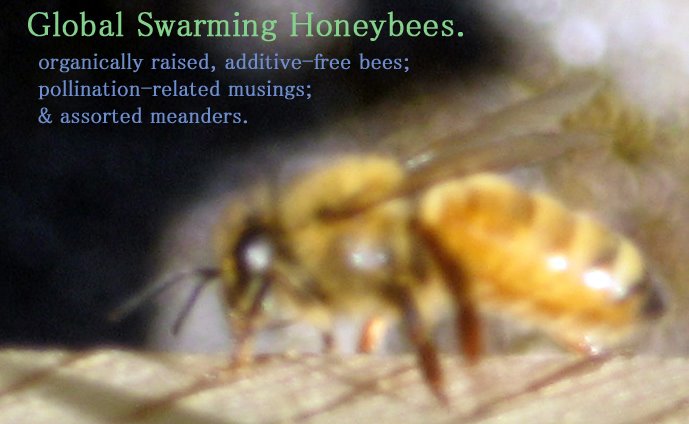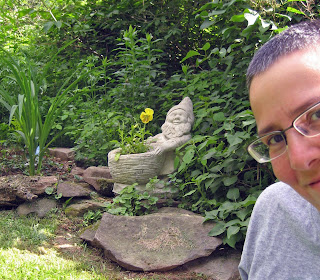

As a novice beekeeper trying to find information about beekeeping methods that did not require the use of “extraordinary (chemical) measures” to keep colonies viable, the web was, until very recently, the sole source of information out there. Through the organic beekeepers’ listserv, Michael Bush’s beekeeping website, Phil Chandler’s writings, and many other online resources, I’ve been able to locate enough information to try my hand at organic, top-bar hive beekeeping in ways consistent with my desire to keep in small, simple, sustainable, and green.
The web has also been an amazing source of fellowship. In the old days, beekeeping was bound up with apprenticeship, a skill passed along from one person to another through direct observation. That’s often still the case; beekeeping clubs continue to be a major venue for meeting other beekeepers and sharing knowledge.
Alas, from the reports I hear, too few clubs seem receptive to so-called alternative methods like top-bar hive beekeeping or organic colony management. Fortunately, cyberspace offers a rich portal for communicating with real humans with real experience in these beekeeping methods—and these individuals are generously willing to mentor, explain, demystify, and provide kindhearted support to new beekeepers through the highs, lows, dramas, traumas, mysteries, and thrills of beekeeping. I feel I’m getting something akin to true mentorship through the web, though I’ve yet to meet any of my mentors in person.
One of the hardest parts of beekeeping is leaving the bees behind when the time comes to return to the city; I miss them terribly and feel out of sync with the muddy, grassy, leafy existence I delight in during my rural escapades.
I’m not a true Luddite in that I’m not opposed to technological change. But I have what I feel to be a healthy skepticism about the uncritical genuflecting to the digital experience, and I do place a very high value—a premium, in fact—on low- and no-tech pleasures.
1.18.2008
Luddite 2.0
Subscribe to:
Post Comments (Atom)







1 comment:
While it is true that many "online beekeeping experts" have disdain for (or fear of) bee associations, formal education, newsletters, magazines, books, workshops, and other traditional forms of beekeeper interaction, this seems to be merely an expression of just how desperate they are for attention. They apparently want to be your only information source. That's sad.
One should not be so quick to dismiss one's local bee club without at least giving them a chance. Most beekeepers are nice folks. You'll like them.
You may be surprised to find that nothing said by the online self-appointed experts about one's neighboring beekeepers is true, and that one's choices about how one wishes to keep bees are not subjected to hostile criticism.
There's no suppression, no vast conspiracy, no repression of anything. There is a focus on "what works", and there is often a focus on measurement and testing, as we all owe our bees some regular check-ups, but no one is going to give you a hard time about your choices, whatever they might be.
Top Bar hives and keeping bees without miticides/pesticides are certainly nothing new, and are fairly common tactics among beekeeping club members. They are well-documented, and have both some advantages and some drawbacks, like any approach has.
I guess the "online" beekeeping "gurus" would not get so much rapt attention if they honestly admitted that their "fans" might be better served by meeting other beekeepers face to face, taking in a few seminars, and reading a book or subscribing to a magazine.
Or perhaps the online beekeepers would seem somewhat less heroic if it was revealed that it is not the practices that have been rejected, but more likely, the annoying self-aggrandizement of these self-proclaimed experts.
The reason is simple - nobody can stand a know-it-all forever. :)
Post a Comment